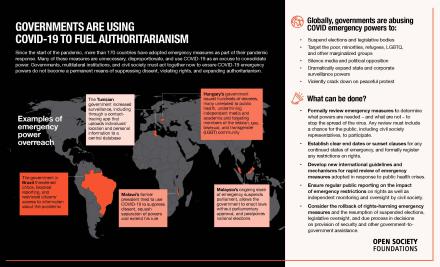In 2021, states around Europe have continued to adopt restrictive measures affecting civic freedoms under the pretext of COVID-19 pandemic. In our latest overview of trends in adopting such measures, we emphasized that while some of these measures can be justifiable, it is essential to monitor and scrutinize them especially for their necessity and proportionality.
We continue to pursue this mission and invite you to read some of our recent updates:
Ireland
In June, Ireland has passed another extension of the state of emergency lasting until November 2021. Under the state of emergency, government can continue to adopt restrictions on gatherings, movement and other areas of democratic life without a need to obtain parliament’s approval. Civil society groups are concerned that this allows to concentrate too much power in “one pair of hands”.
Georgia
In April 2021, the Parliament in Georgia adopted amendments to the Code of administrative offenses, increasing sanctions for the offenses of the petty hooliganism and police disobedience, and prolonging terms of administrative detention - charges most frequently used against participants of assemblies and manifestations in Georgia. The Code includes substantive flaws, such as lack of due process and fair trial guarantees and standard of proof required for holding the person responsible. This is especially problematic in relation to the above underlined offenses of petty hooliganism and police disobedience, considering that the protestors are arrested under these charges, while having no guarantees of fair trial and right to reasoned decision. (See also the CSO Meter website for more details.)
Slovenia
In Slovenia, throughout the pandemic, public authorities have been imposing arbitrary bans on assemblies and did not permit protests even when other types of gatherings were allowed. The bans were directly targeting gatherings of people with the intention to exercise the freedom of assembly. One of the administrative decisions was successfully challenged by a network of civil society organizations which lead to the modification of the government ordinance.
Stay tuned for our briefer to be published soon on court cases that challenge the state of emergencies!
Are you interested to read similar updates? Check out our COVID-19 Civic Freedom Tracker, launched by ECNL and ICNL to monitor government responses to the pandemic that affect civic freedoms and human rights, focusing on emergency laws. The tracker is developed with the generous research support from the UN Special Rapporteur on the promotion and protection of human rights and fundamental freedoms while countering terrorism, Fionnuala D. Ní Aoláin.
Since the start of the pandemic, more than 170 countries have adopted emergency measures as part of their pandemic response. Many of these measures are unnecessary, disproportionate, and use COVID-19 as an excuse to consolidate power. Check out also this one pager on the dangers of emergency powers and what can be done against their abuse:
